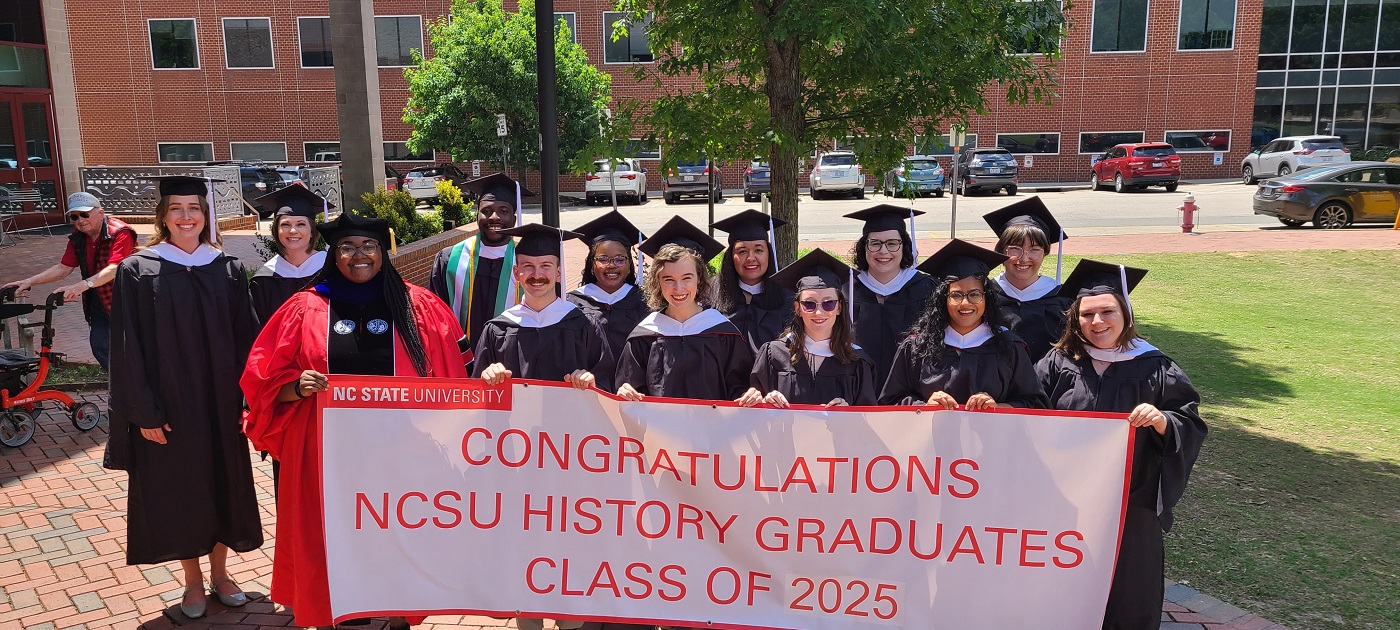Graduate History Alumna Reconnects with NC State and Aids USDA Outreach Initiatives
Stacy Roberts graduated from NC State with the History M.A. degree in May 2014. She worked with Professor Matthew Booker on her thesis entitled How We Have Forgotten: Chemical Strawberries and Their Archived Alternatives in the Nineteenth and Twentieth Centuries. After graduation, Stacy enrolled as a Ph.D. student at University of California-Davis. Now she’s back.
For the next two months Stacy will make NC State’s Centennial Campus her home, as she interns at the U.S. Department of Agriculture’s Southeast Regional Climate Hub (SERCH). Here Stacy will combine her training in environmental history with a project to aid SERCH in developing better relationships with agricultural communities that have been underserved by the USDA since 1945. Stacy’s experience at SERCH will fulfill her internship requirement at UC-Davis and contribute to her Ph.D. dissertation research. Under the Obama Administration, the USDA divided up the country into seven sections and established regional climate hubs—of which SERCH is one—to address issues associated with climate change. The mission of the hubs is to “deliver science-based knowledge and practical information on climate change to farmers, ranchers, and forest land managers” in order to help producers cope with challenges associated with climate change, such as drought, heat stress, excessive moisture, longer growing seasons, and changes in pest pressures. SERCH has partnered with NC State and other universities, the Southeast Climate Science Center, and the private sector to create cutting-edge strategies and methodologies to support its mission. But the effects of climate change are not the only challenges U.S. farmers face in the twenty-first century. After World War II, U.S. farming practices grew increasingly mechanized, efficient, and productive, thanks to advances in technology, chemical usage, and USDA support. Research conducted by Land Grant universities, like NC State, has been central to shaping the USDA’s promotion of modern agribusiness. And while large-scale agriculture has resulted in many notable benefits, such as low-cost food, less greenhouse emissions relative to the amount of food produced, and more efficient land use, the growth of American agribusiness has also brought with it many unintended consequences. In recent decades, environmental, conservation, and public health movements have centered agricultural policy debates on questions of land use, food safety, and the marginalization of the small-scale farmer—especially in African American, Native American, and Hispanic farming communities. Current trends in re-evaluating food production and consumption have also led to popular calls to “eat fresh” or “buy local”—creating what Jessica Prentice has termed the “locavore” movement. And while local and small-scale farmers have not taken over the farming industry, they have contributed to the diversification of the industry, as well as to the ways Americans think about and consume food. With parallel trends in climate change and cultural consumption practices rapidly re-shaping the nature of U.S. agriculture, a question for the USDA has become how to adapt to best address the needs of producers of all scales. And this project of adaptation leads to some interesting questions, all of which Stacy hopes to address during her internship with SERCH. Primarily, if the USDA desires to use its regional climate hubs to communicate science-based knowledge and practical information to local producers today, how does it plan to reach these small-scale farmers—especially minority farming communities that have historically been underserved by the USDA? What communication strategies have served to either include or exclude farming communities, and how might SERCH help foster better relationships between them and the USDA today? Using archival material from NC State’s Special Collections and personal interviews with African American, Native American, and Hispanic farmers throughout the South, Stacy will develop a report designed to help SERCH better address some of the most pressing issues of our time—climate change, food security, and social justice. Welcome back, Stacy!
- Categories:


